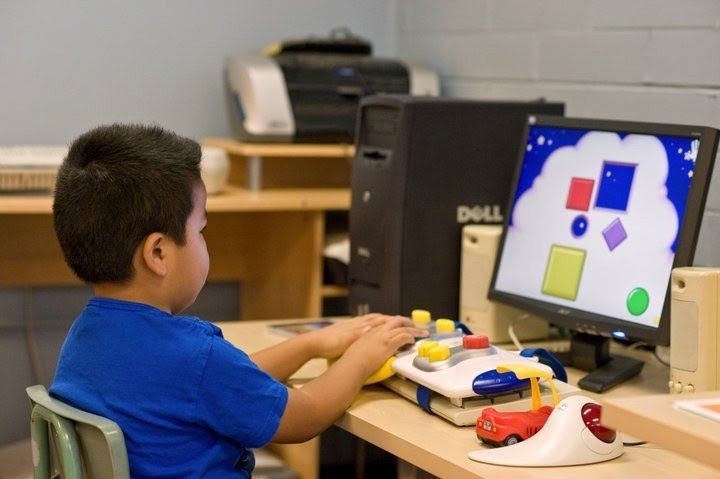The improvements in assistive technology for autism have made great progress in improving the lives of persons with autism spectrum disorder (ASD). These advances offer crucial assistance, allowing people lead more independent and productive lives by boosting communication, social skills, and learning capacities. In this blog, we will examine the numerous ways assistive technology is empowering persons with autism and the resources available to help them.
What is Assistive Technology for Autism?
Assistive technology for autism refers to equipment, technologies, and software meant to assist persons with autism better engage with their surroundings. These technologies are used to solve a broad variety of issues, including communication difficulties, learning impediments, and social interaction. From speech-generating gadgets to applications that aid with social skills, assistive technology is transforming the way persons with autism manage their everyday lives.
Communication Support: Empowering Individuals With Autism
One of the key advantages of assistive technology for autism is its capacity to increase communication. Many persons with autism encounter difficulty when it comes to verbal communication, and technology may assist bridge this gap. Speech-generating devices (SGDs) are among the most common instruments used to assist persons articulate their needs, ideas, and feelings. These gadgets enable nonverbal persons to communicate via symbols, text, or vocal output, creating a feeling of independence and lowering frustration.
In addition to SGDs, many autism support programs now include communication applications that enable users to pick pictures or phrases that are subsequently spoken aloud. These tools foster both verbal and non-verbal communication and may be adjusted to match the requirements of any person.
Social Skills Training: Using Technology for Interaction
Another area where assistive technology for autism has had a big effect is in social skills training autism. Many persons with autism suffer with social interactions owing to difficulty in comprehending social signals, body language, and acceptable responses. Technology-based programs and apps have been created to help people practice and enhance their social skills in a controlled setting.
For example, virtual reality (VR) systems are being utilized in autism support services to replicate social interactions, enabling people to practice navigating social issues including establishing eye contact, taking turns, and having conversations. These tools generally give rapid feedback, letting users learn how they may enhance their relationships in real-world circumstances.
Autism Support Services: Comprehensive Solutions for Individuals
Autism support services are vital for families and people impacted by autism. These services include a broad variety of resources such as autism awareness events in Florida, educational programs, and tailored support plans. They assist people and their families obtain the resources and methods required to succeed.
Innovative assistive technology is typically incorporated into these services, giving bespoke solutions that are based on the individual’s unique requirements. For example, several autism support groups around me provide courses and training sessions on how to utilize technology to help persons with autism in all facets of their life, from school to employment and social situations.
Programs for Adults with Autism: Supporting Independence
While most of the emphasis on autism services has traditionally been on children, programs for adults with autism are becoming more essential. These programs are meant to assist adults with autism move into adulthood, giving support for employment, independent living, and social integration.
Assistive technology plays a crucial part in these programs by offering tools that assist individuals with autism in accomplishing everyday chores and building employment skills. For instance, task management applications may help folks keep organized, while social communication tools can aid with interpersonal relationships. These programs not only enable persons with autism to live independently but also empower them to engage fully in society.
Autism Awareness: Connecting the Community
Raising awareness of autism and the issues experienced by persons with ASD is crucial for building understanding and support. Autism awareness events serve a significant role in educating the public and providing a forum for people and families impacted by autism to connect.
Autism awareness events in Florida are organized throughout the year, bringing together families, professionals, and activists to exchange information and experiences. These events generally involve educational seminars, workshops, and chances to connect with autism support groups. By participating in these events, people may access autism services in Florida and learn about the newest advancements in assistive technology.
Conclusion: Empowering Lives with the Dan Marino Foundation
The impact of assistive technology for autism in enhancing the lives of persons with autism cannot be emphasized. From communication tools to social skills training, technology is bringing people new options for independence and success. By combining creative solutions with supporting programs and services, persons with autism are enabled to tackle life’s problems with confidence.
If you’re seeking complete assistance and services, the Dan Marino Foundation is here to help. With its mission to empowering persons with autism via individualized programming and cutting-edge technology, the foundation continues to have a lasting influence on the autistic community.
Take the first step towards enriching the lives of those with autism. Contact the Dan Marino Foundation now and explore the vast selection of programs and services available.

